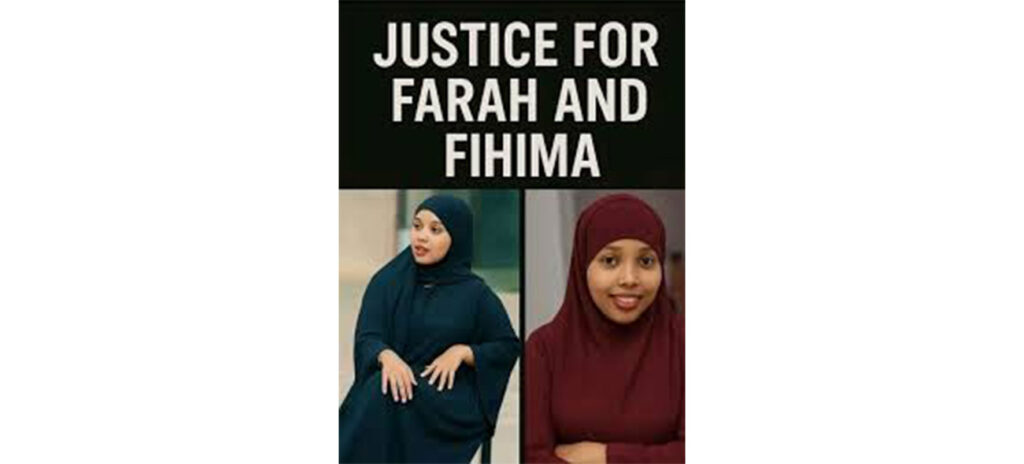
On June 13, 2025, in the town of Lascanood located near the contested border between Somalia and Somaliland, two young sisters, Fahima Yasiin Mohamoud (16 years old) and Farah Yasiin Mohamoud (17 years old) , were brutally beaten and gang-raped by twenty-five (25) men aged between 17 and 20 years old. This horrifying and barbaric case has sent shockwaves throughout the community and beyond, both online and offline. This is not only because of the severity of the violence – it highlights the broader, systematic, and deeply entrenched crisis of sexual violence affecting women and girls across Somalia.
At present, these sisters are in critical condition and are being attended to at a hospital in Mogadishu. Farah is reportedly in a coma following this horrific incident. Fahima is reported as experiencing a traumatic breakdown in her mental health. Both their lives currently hang in the balance and have been forever marked by this ordeal. Lascanood Police have arrested about twenty (21) of the alleged perpetrators so far. With four (4) perpetrators still at large, these sisters remain vulnerable. Beyond the arrests made, the Mayor of Lascanood held a media briefing concerning the incident on June 13, 2025, stating that investigations are ongoing. However, there have been no further updates since. Noting the gravity of this case, this silence is deafening. It is unacceptable and extremely dangerous.
The case of Fahima and Farah is not an isolated incident. Across Somalia, thousands of women and girls face rape, sexual harassment, assault, and exploitation—often with no safe pathways to seek justice, medical attention or psychosocial support. In too many cases, survivors are pressured to remain silent or resolve their cases through traditional mechanisms that prioritize community stability over justice, accountability, and survivor protection.
The data is equally sobering. In 2024, the Coalition of Somalia Human Rights Defenders recorded over 1,200 cases of sexual and gender-based violence (SGBV) across Somalia. These included rape, physical assault, early and forced marriage, and sexual exploitation. In Somaliland, the National Human Rights Commission reported 752 cases of rape in 2023. Alarmingly, over 60% of these cases were handled outside the formal legal system, leaving survivors without proper protection or legal redress.
Most of these incidents occurred in areas affected by conflict, displacement, and weak governance in environments where the rule of law is absent, enabling perpetrators to act with impunity. Somalia’s internally displaced population, which includes over 3.8 million people, remains particularly vulnerable. Displaced women and girls, many of whom live in insecure shelters with limited access to health services, face elevated risks of sexual violence, especially when performing everyday tasks like fetching water or accessing sanitation facilities. The situation in Lascanood further illustrates how political instability and militarization escalate the risk of SGBV. Since early 2023, violent clashes between Somaliland forces and Dhulbahante clan militias in this area have created a volatile environment in which civilians, particularly women and girls, have been left exposed. The collapse of local governance structures and the absence of trained, gender-sensitive law enforcement have rendered many survivors invisible.
Overall, Somalia is at a critical stage. As the President pushes for one person, one vote elections and navigates ongoing state-building efforts, the safety and rights of women and girls must not be overlooked. True peace and development are impossible when half the population lives in fear and survivors of rape are met with silence instead of support.
The rape of Fahima and Farah must serve as a wake-up call. Their case cannot be ignored or forgotten, nor can it be addressed through informal settlements that deny them justice and dignity. We therefore call for a coordinated, multi-level response as follows:
The Government of Somalia and the Local Authorities of Lascanood
- Immediate and independent investigation into the case of these sisters by Somalia and local government authorities in Lascanood including the Ministry of Family and Human Rights Development, the police and the mandated prosecutor, with full legal accountability for all perpetrators. In this regard, the investigation process must be survivor-centered, remain transparent to the public, and the alleged perpetrators must be brought promptly to court. The case must be handled as a matter of justice, free from clan-based interference or politicization, to uphold accountability and restore trust.
- The provision of survivor-centered services for Fahima and Farah but more broadly for all survivors of SGBV in high-risk regions, including trauma counseling, mobile health clinics, legal aid, and secure shelters.
- Overall legal reform and the enforcement of existing national and international legal frameworks to prevent and prosecute SGBV. We call on Somalia to strengthen its commitment to addressing such cases through the ratification and domestication of the Convention on the Elimination of All Forms of Discrimination Against Women and the Maputo Protocol. We further call for the full use and implementation of Somalia’s National Action Plan (NAP) for Women, Peace and Security under United Nations Security Council Resolution 1325 together with its renewal for the period of 2025/2027.
Women-Led Grassroot Organizations and Civil Society
- The formation of a strong network of women-led grassroot organizations to enhance public awareness on SGBV in Somalia and its root causes, centering the collective voices of the community, traditional and religious leaders in condemning violence against women and girls once and for all.
International Community and Development Partners
- Investment in and meaningful support for women-led grassroot organizations that are actively supporting survivors, documenting cases, and advocating for systemic change.
If we act now with urgency, integrity, and compassion, we can prevent further harm, support those who have been hurt, and begin to build a Somalia where every woman and girl is safe, heard, and protected.
Photo Credit: Internet
